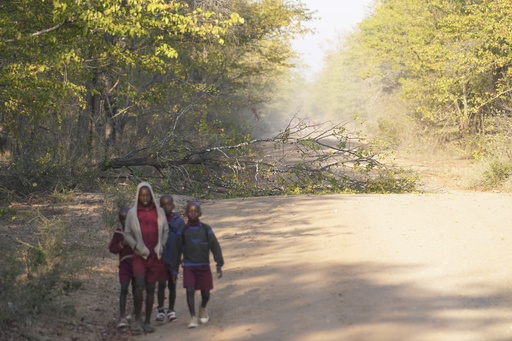In the Save Valley Conservancy in Zimbabwe, 14-year-old Esther Bote embarks on her daily routine in the early morning hours, preparing for the perilous 5-kilometer walk to school through bush paths and forests where dangerous animals may be lurking. Esther, like many other children in the area, faces the constant threat of encountering wildlife on her journey to and from school, a reality shaped by repeated droughts and human-induced climate change leading to resource competition between humans and animals.
Due to the escalating proximity of wildlife to human settlements, children in the region are now receiving education on animal behavior to adapt to this new coexistence. Students, including Esther, are learning to recognize danger signs, wildlife footprints, sounds, and how to take cover when needed. The Save Valley Conservancy and the country’s parks agency have collaborated on a program to educate school-age children on peacefully coexisting with wildlife.
Esther and her classmates have been taught not to approach wild animals, like lions seeking easy prey in communities, and to travel in groups for safety. Additionally, the initiative aims to instill a sense of respect and understanding towards wildlife in the children, viewing animals as beneficial to the community rather than adversaries. The training sessions include lessons on wildlife benefits, such as tourism and employment opportunities, demonstrated by the employment of young women rangers from the community.
Although data on the initiative’s effectiveness is not yet available, it has encouraged some previously hesitant parents to send their children to school. However, some parents advocate for adjustments like later school arrival times to ensure children’s safety from wildlife encounters. With increasing reports of children withdrawing from school due to safety concerns and teachers struggling to commute to work, the challenge of coexisting with wildlife in rural areas persists.
The Zimbabwe National Parks and Wildlife Management Authority is advocating for the integration of animal behavior and conservation training in schools nationwide to address the growing need for communities to live alongside wildlife affected by climate change-induced droughts. Through school programs and environmental clubs, children are becoming advocates for wildlife conservation, enlightening their families on potential dangers and the importance of peaceful coexistence with animals.
Despite ongoing risks, Esther acknowledges the value of the training she has received in understanding animal behavior. She recognizes that until a resolution is found, her education is somewhat hindered by the presence of wildlife. Nevertheless, she remains hopeful that the knowledge she has gained will prove useful in navigating potential dangers in the future.


